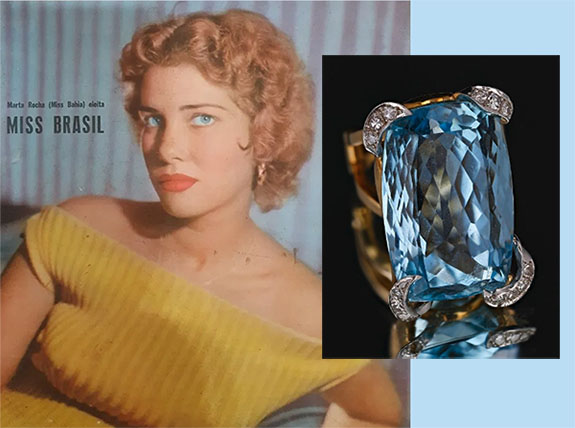In the lead-up to the the 1954 Miss Universe pageant, the runaway favorite to win the title was Maria Martha Hacker Rocha, a statuesque 21-year-old Brazilian beauty with captivating blue eyes. She had captured the title of Miss Bahia in her home state and went on to become the first-ever Miss Brazil.
The pageant took place at the Municipal Auditorium in Long Beach, CA, and although Rocha eventually would become the runner-up to American Miriam Stevenson, the Brazilian won the hearts of fans all over the world. They were smitten by her grace and elegance.
Around the same time as Rocha was competing on the world stage, an incredible 74.5-pound aquamarine crystal was unearthed on a farm near Teofilo Otoni, Brazil. Its color was so rich, so intense that the Brazilian gem dealers needed to come up with a special name to distinguish it from the rest.
The rare, intense blue aquamarines from the Santa Maria de Itabira mine in Brazil were called “Santa Maria.” Similar-color aquamarines from Mozambique and other countries in Africa were named “Santa Maria Africana.” Lighter hues were named after the Brazilian state where they were mined, specifically “Espirito Santo.”
The new classification would be called “Martha Rocha,” representing a tone and intensity of the finest-color aquamarines. Even today, gem experts use this rating as a lasting tribute to the Brazilian beauty queen with captivating clear blue eyes.
Rocha, who passed away in 2020 at the age of 87, continues to be a symbol of beauty in Brazil. She has streets named after her in Bahia, Santa Catarina and São Paulo. The Brazilians even named a delicious and decadent dessert after her. Ask for a "Martha Rocha" at a Brazilian fine dining establishment and you will receive a treat made from white and chocolate cake with cream, peaches, creamy egg custard and walnuts.
Aquamarine, the official birthstone for the month of March, is the sea-blue variety of the mineral beryl, whose family members include emerald (intense green) and morganite (pink to orange-pink). Aquamarines can range in color from light blue to pure blue to shades of greenish-blue. The variations in blue color are dependent on trace amounts of iron in the gemstone’s chemical composition. Interestingly, pure beryl is absolutely colorless.
Aquamarines are mined in many countries, including Nigeria, Madagascar, Zambia, Pakistan, Mozambique and the US, but most of the finest-quality gemstones still come from Brazil.
Credit: Martha Rocha image by Gráficos Bloch S.A., Public domain, via Wikimedia Commons. Aquamarine image by Greg Polley / Smithsonian.

No comments:
Post a Comment